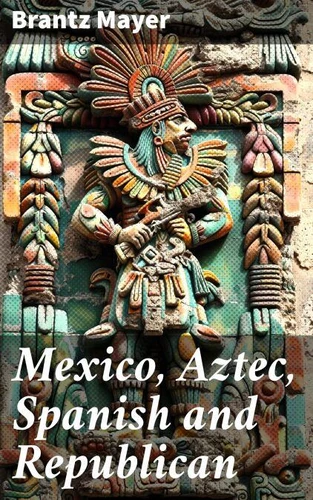Mexico, Aztec, Spanish and Republican. A Historical, Geographical, Political and Social Account of Mexico From the Period of the Invasion until 19th Century
Par :Formats :
Disponible dans votre compte client Decitre ou Furet du Nord dès validation de votre commande. Le format ePub est :
- Compatible avec une lecture sur My Vivlio (smartphone, tablette, ordinateur)
- Compatible avec une lecture sur liseuses Vivlio
- Pour les liseuses autres que Vivlio, vous devez utiliser le logiciel Adobe Digital Edition. Non compatible avec la lecture sur les liseuses Kindle, Remarkable et Sony
 , qui est-ce ?
, qui est-ce ?Notre partenaire de plateforme de lecture numérique où vous retrouverez l'ensemble de vos ebooks gratuitement
Pour en savoir plus sur nos ebooks, consultez notre aide en ligne ici
- Nombre de pages965
- FormatePub
- ISBN859-65--4777722-9
- EAN8596547777229
- Date de parution13/12/2023
- Protection num.Digital Watermarking
- Taille9 Mo
- Infos supplémentairesepub
- ÉditeurGOOD PRESS
Résumé
In "Mexico, Aztec, Spanish and Republican, " Brantz Mayer offers a comprehensive and nuanced exploration of Mexico's rich and tumultuous history, intertwining its indigenous roots with European colonial influences and the subsequent forging of a republican identity. Mayer's literary style blends meticulous historical research with vivid narrative prose, presenting readers with an engaging account that captures the complexities of Mexico'Äôs past.
Contextualized within the 19th-century discourse on nationalism and identity, the book serves as both a historical narrative and a critical commentary on the socio-political dynamics of Mexico during a transformative era. Brantz Mayer, an American historian and journalist of the 19th century, was profoundly influenced by his travels and interactions with Mexican society. His firsthand observations and scholarly pursuits illuminated the interplay between ancient civilizations and modern governance in Mexico.
Mayer's commitment to uncovering the deeper narratives behind national histories is evident in this work, as he seeks to foster a greater understanding of Mexico's multifaceted identity through the lens of its indigenous and colonial heritage. This book is highly recommended for readers interested in Mexican history, colonial studies, and the evolution of national identities. Mayer's erudite yet accessible approach provides insightful perspectives for scholars and general readers alike, making it an essential addition to any library focused on Latin American historical narratives.
Contextualized within the 19th-century discourse on nationalism and identity, the book serves as both a historical narrative and a critical commentary on the socio-political dynamics of Mexico during a transformative era. Brantz Mayer, an American historian and journalist of the 19th century, was profoundly influenced by his travels and interactions with Mexican society. His firsthand observations and scholarly pursuits illuminated the interplay between ancient civilizations and modern governance in Mexico.
Mayer's commitment to uncovering the deeper narratives behind national histories is evident in this work, as he seeks to foster a greater understanding of Mexico's multifaceted identity through the lens of its indigenous and colonial heritage. This book is highly recommended for readers interested in Mexican history, colonial studies, and the evolution of national identities. Mayer's erudite yet accessible approach provides insightful perspectives for scholars and general readers alike, making it an essential addition to any library focused on Latin American historical narratives.
In "Mexico, Aztec, Spanish and Republican, " Brantz Mayer offers a comprehensive and nuanced exploration of Mexico's rich and tumultuous history, intertwining its indigenous roots with European colonial influences and the subsequent forging of a republican identity. Mayer's literary style blends meticulous historical research with vivid narrative prose, presenting readers with an engaging account that captures the complexities of Mexico'Äôs past.
Contextualized within the 19th-century discourse on nationalism and identity, the book serves as both a historical narrative and a critical commentary on the socio-political dynamics of Mexico during a transformative era. Brantz Mayer, an American historian and journalist of the 19th century, was profoundly influenced by his travels and interactions with Mexican society. His firsthand observations and scholarly pursuits illuminated the interplay between ancient civilizations and modern governance in Mexico.
Mayer's commitment to uncovering the deeper narratives behind national histories is evident in this work, as he seeks to foster a greater understanding of Mexico's multifaceted identity through the lens of its indigenous and colonial heritage. This book is highly recommended for readers interested in Mexican history, colonial studies, and the evolution of national identities. Mayer's erudite yet accessible approach provides insightful perspectives for scholars and general readers alike, making it an essential addition to any library focused on Latin American historical narratives.
Contextualized within the 19th-century discourse on nationalism and identity, the book serves as both a historical narrative and a critical commentary on the socio-political dynamics of Mexico during a transformative era. Brantz Mayer, an American historian and journalist of the 19th century, was profoundly influenced by his travels and interactions with Mexican society. His firsthand observations and scholarly pursuits illuminated the interplay between ancient civilizations and modern governance in Mexico.
Mayer's commitment to uncovering the deeper narratives behind national histories is evident in this work, as he seeks to foster a greater understanding of Mexico's multifaceted identity through the lens of its indigenous and colonial heritage. This book is highly recommended for readers interested in Mexican history, colonial studies, and the evolution of national identities. Mayer's erudite yet accessible approach provides insightful perspectives for scholars and general readers alike, making it an essential addition to any library focused on Latin American historical narratives.




